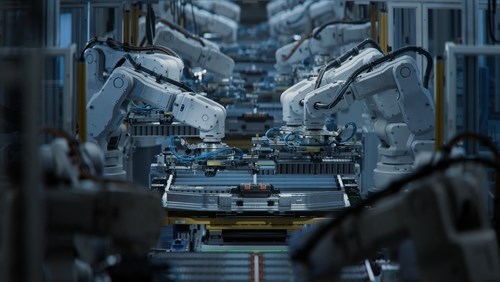
SCANOLOGY has just introduced NimbleTrack Gen2. With upgraded technology, SCANOLOGY's NimbleTrack Gen2 is capable of scanning large and complex areas significantly faster, while maintaining measurement-level accuracy. This is the next generation of the company's mobile optical tracking and 3D scanning systems. SCANOLOGY's NimbleTrack Gen2 is designed to deliver higher performance, especially in speed and measurement range.

A breakthrough opportunity for R&D processes awaits the Vietnamese engineering community. The specialized workshop "Driving Engineering Innovation Through Smart Simulation" organized by ANSYS will take place on October 29, 2025, at the Innovation Hub Building, updating the latest advanced simulation solutions for the manufacturing, electronics design, and Nano-Micro industries.

In the global race to automate manufacturing, China is emerging as a pioneer with the “dark factory” model – where robots and artificial intelligence completely replace humans. Requiring no light or rest, the new generation of factories operate continuously 24/7 with superior precision and efficiency.
Tokuyama Corporation (Japan) has announced plans to construct a polysilicon manufacturing plant for semiconductors in Vietnam.
The information was announced at the Vietnam - Japan Cooperation Forum on the afternoon of April 28 in Hanoi, co-chaired by Vietnamese Prime Minister Pham Minh Chinh and Japanese Prime Minister Ishiba Shigeru.

Japanese Prime Minister Ishiba Shigeru and Vietnamese Prime Minister Pham Minh Chinh at the Vietnam - Japan Cooperation Forum. Photo: Duc Thanh
At the forum, Vietnamese and Japanese businesses shared cooperation and business plans to realize a common vision for science, technology, innovation, digital transformation, and green transformation.
Tokuyama, a world-leading company in crystalline silicon for semiconductors, announced it is preparing to establish a production facility in Vietnam. "With Vietnam's policies prioritizing semiconductor industry development, we decided to build a polysilicon plant in Ba Ria - Vung Tau," a Tokuyama representative stated.
Meanwhile, Mr. Truong Gia Binh, Chairman of FPT, said that Sumitomo Corporation and SBI Holdings last week collaborated with FPT to build an artificial intelligence factory with Nvidia in Japan. According to him, Vietnam can complement Japan with its young, talented, and ambitious human resources.
Having established an R&D center in Vietnam early on, Mr. Taka Fujino, General Director of Panasonic Vietnam, stated that the center currently has 180 talented Vietnamese employees. This center is oriented to "become a software development company with the most advanced technology, providing digital transformation solutions for factories."

Prime Minister Shigeru assessed Vietnam as a potential destination for Japanese businesses due to its market of 100 million people and high-quality human resources.
In the context of an unstable global economy, he evaluated this as an opportunity for the two countries to promote cooperation in high-tech industry development, increasing resilience to external shocks. "That is a common benefit for both nations," he said.
Japan will support Vietnam in training and developing human resources, accepting 250 doctoral researchers in semiconductors. Prime Minister Shigeru pledged to help Vietnam develop high-tech industries, reduce carbon emissions, and build polysilicon manufacturing plants – an indispensable material in semiconductors.
According to him, "the potential for Vietnam - Japan cooperation is unlimited." "The governments of both countries will accompany businesses so that this cooperative relationship contributes to peace and development in the region and the world," he shared.
Prime Minister Pham Minh Chinh and Japanese Prime Minister Ishiba Shigeru witnessed the signing ceremony of an agreement on semiconductor human resource development cooperation between the National Innovation Center (NIC) and Hiroshima University, and the Vietnam Japan Expert Association (VJS). Photo: Duc Thanh
According to Prime Minister Pham Minh Chinh, Japan is currently Vietnam's leading economic partner, the largest ODA capital provider and labor cooperation partner, the third-largest investment partner, and the fourth-largest trade and tourism partner of Vietnam.
As of March, Japan had 5,500 valid projects in Vietnam, with a total capital of nearly 80 billion USD, spread across 59 provinces and cities. These projects mainly focus on processing industries, energy, high technology, healthcare, and education. In Q1/2025, investment capital from Japan increased by 20% compared to the same period, which is a positive sign for a new cooperation phase.
Sharing with businesses, the Prime Minister stated that Vietnam is improving its business investment environment with the spirit of "3 openness": open institutions, smooth infrastructure, and smart people.
In parallel, Vietnam is implementing a "strategic quartet," including a revolution in organizational structure and administrative unit arrangement; promoting the development of science and technology, innovation, and digital transformation to develop the digital economy; considering the private economy as the most important driving force for national economic development; and deep international integration.
Prime Minister Pham Minh Chinh proposed that the Japanese government accompany and enhance support for Vietnam through new-generation ODA programs, especially for strategic technologies, high technology, digital transformation, green transformation, and innovation. He expressed a desire for Japan to transfer green finance technology, green transformation, and train human resources for the semiconductor industry, AI, etc., to Vietnam.
At the forum, both Prime Ministers also emphasized the role of the National Innovation Center (NIC) as a "nucleus" focal point for innovation cooperation between the two countries.
Trong Dat
(84) 896 555 247